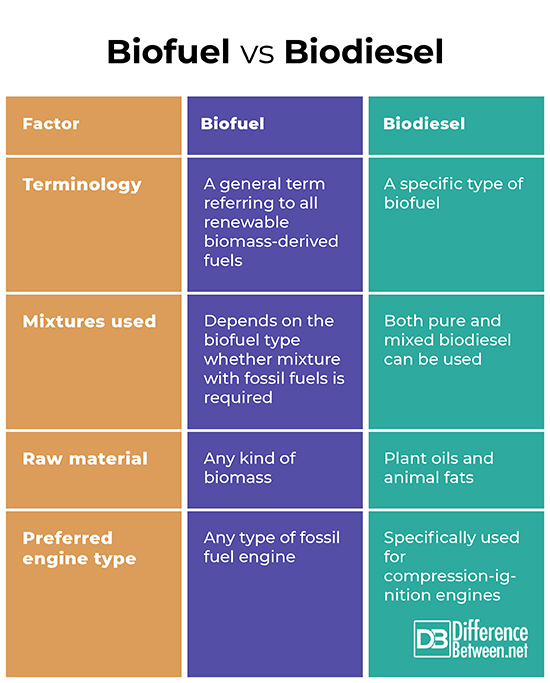Difference Between Biofuel and Biodiesel

Biofuel
Biofuel refers to fuel that has been converted from biomass. Biomass is living material, or the product of living material, including plants and animals. Biofuels are considered a form of renewable energy because the source of the fuel can be regrown.
What is the difference between biofuel and biomass?
Biomass is a general term referring to living matter, or the products of living matter, such as wood chips or manure. Biofuel refers specifically to the biomass that has been converted into a liquid fuel.
What is the difference between biofuel and fuel?
Most fuel used today for energy supply is based off fossil fuels such as coal, petroleum, and natural gas. Fossil fuels, as their name implies, were formed millions of years ago from the remains of living organisms. Biofuels, on the other hand, are produced directly or indirectly from living organisms that exist today.
Advantages and disadvantages of biofuels
Biofuels are often considered a more environmentally friendly alternative to traditionally used fossil fuels. They are non-toxic compared to fossil fuels and may have a lower carbon footprint. This is because, in theory, some of the carbon dioxide produced will be absorbed by the biomass regrown to replace the biofuels that are burned. Furthermore, since biofuels are chemically very similar to fossil fuels, they can be easily incorporated into the current fuel infrastructure. Most gasoline in the United States, for example, already contains a percentage of ethanol, a biofuel made from plant sugars. Also, since biofuels are renewable, they could be used indefinitely, whereas fossil fuel sources will eventually be exhausted.
On the other hand, critics point out that fossil fuels are still used in the production of biofuels. This is particularly true of biofuels produced from crops, such as corn and soybeans, which are also raised as food. These crops often involve the use of industrial fertilizers and the burning of fossil fuels as an energy source in their harvesting and production, even when used to make biofuels.
Another major issue with biofuels is that crops grown for fuel could compete for crops grown for food, affecting the price of food crops. Furthermore, the land needed to produce fuel crops would not only take away from land for food crops. It would also require the clearing of wilderness areas and have an adverse effect on the natural environment and biodiversity.

Biodiesel
Biodiesel is a form of biofuel that is produced from plant oils and animal fats. Most biodiesel is produced from vegetable oil. Biodiesel is used in compression-ignition engines like diesel based on fossil fuels.
Biodiesel and biofuel
There are two major types of biofuel, ethanol and biodiesel. Ethanol is made from the starches and sugars of plant materials, largely corn (maize) in the United States or sugarcane in Brazil. Biodiesel, on the other hand, is made from plant oils or animal fats. As a result, biodiesel is biofuel but not all biofuels are biodiesel.
Advantages and disadvantages of biodiesel
Biodiesel generally takes less energy and produces fewer carbon emissions than the production of other biofuels, such as ethanol.
On the other hand, biodiesel production has been criticized for its negative environmental impact. In southeast Asia, the planting of oil palm plantations to produce biodiesel has led to deforestation which has contributed to climate change and loss of biodiversity.
Similarities between Biofuel and Biodiesel
Why is biodiesel considered a biofuel?
Biodiesel is produced from living organisms which count as biomass. The definition of biofuel is fuel produced from biomass. biodiesel is a fuel produced from biomass. Therefore, biodiesel is a type of biofuel.
Differences between Biofuel and Biodiesel
Although biofuel and biodiesel are related terms, there are important differences. These include the following.
- Biofuel is a general term for biomass-derived fuels, which can refer to both ethanol and biodiesel, whereas biodiesel is a specific type of biofuel.
- Some biofuels, such as ethanol, are mixed with fossil fuels, whereas the use of pure biodiesel (B100) is not uncommon.
- Biofuel is made from a variety of types of biomass, whereas biodiesel is specifically made from oils and fats from plants and animals, respectively.
- Biofuels are used for a variety of engines, whereas biodiesel is mainly used for compression-ignition engines.
Biofuel vs. Biodiesel

Summary
Biofuel is a term referring to any fuel produced from presently or very recently living biomass. Biofuel is considered a renewable source of energy since biomass is self-replicating. It is also considered by its proponents to be an environmentally friendly alternative to fossil fuels that could help reduce carbon emissions. Its drawbacks are that it may not be entirely carbon neutral depending on how the biofuel is produced. Furthermore, the growing of fuel crops may compete with the growing of food crops. Biodiesel is produced from plant oils and animal fats. It is used in compression-ignition engines like fossil-fuel-based diesel. Although biodiesel is renewable and potentially low carbon, it also has drawbacks. Its production is encouraging the growth of oil palm plantations in southeast Asia for which rainforests must be cleared, accelerating biodiversity loss and climate change. Biodiesel and biofuel are similar in that biodiesel is a type of biofuel, since it is derived from biomass. They also differ in important ways. Biofuel is a general term that includes ethanol and biodiesel. Biofuels may or may not require being mixed with fossil fuels to be effective, can be made from any type of biomass, and can be used for a variety of engines. Biodiesel, on the other hand, is a specific type of biofuel, can be used in pure form or be mixed with fossil fuels, is made from plant oils and animal fats, and is specifically produced for compression-ignition engines.
- Difference Between Environmental Performance Index and Development - November 24, 2023
- Difference Between Environmental Intervention and Development - November 8, 2023
- Difference Between Eco Efficiency and Eco Effectiveness - September 18, 2023
Search DifferenceBetween.net :
Leave a Response
References :
[0]“Biodiesel blends.” U.S. Department of Energy, n.d., https://afdc.energy.gov/fuels/biodiesel_blends.html.
[1]“Biodiesel Fuel Basics.” Department of Energy, n.d., https://afdc.energy.gov/fuels/biodiesel_basics.html#:~:text=Biodiesel%20is%20a%20renewable%2C%20biodegradable,of%20the%20Renewable%20Fuel%20Standard.
[2]“Biofuel Basics.” U.S. Department of Energy, n.d., https://www.energy.gov/eere/bioenergy/biofuel-basics.
[3]“Biofuels explained: Biofuels and the environment.” U.S. Energy Information Administration, 13 April 2022, https://www.eia.gov/energyexplained/biofuels/biofuels-and-the-environment.php.
[4]“Biomass explained.” U.S. Energy Information Administration, 2 June 2022, https://www.eia.gov/energyexplained/biomass/.
[5]Dunbar, Meghan French. “What’s the Difference Between Biodiesel and Ethanol?” SOCAPDIGITAL, https://socapglobal.com/2015/07/whats-the-difference-between-biodiesel-and-ethanol/. Accessed 3 Aug. 2022.
[6]Kopp, Otto C. "fossil fuel". Encyclopedia Britannica, 1 Jun. 2021, https://www.britannica.com/science/fossil-fuel. Accessed 3 August 2022.
[7]Martin, Jeremy. “Everything You Ever Wanted to Know About Biodiesel (Charts and Graphs Included!).” The Equation, 22 June 2016, https://blog.ucsusa.org/jeremy-martin/all-about-biodiesel/. Accessed 9 July 2022.
[8]Patel, Vinood B., ed. Molecular Aspects of Alcohol and Nutrition: A Volume in the Molecular Nutrition Series. Academic Press, 2015.
[9]Selin, Noelle Eckley and Lehman, Clarence. "biofuel". Encyclopedia Britannica, 15 Sep. 2021, https://www.britannica.com/technology/biofuel. Accessed 3 August 2022.
